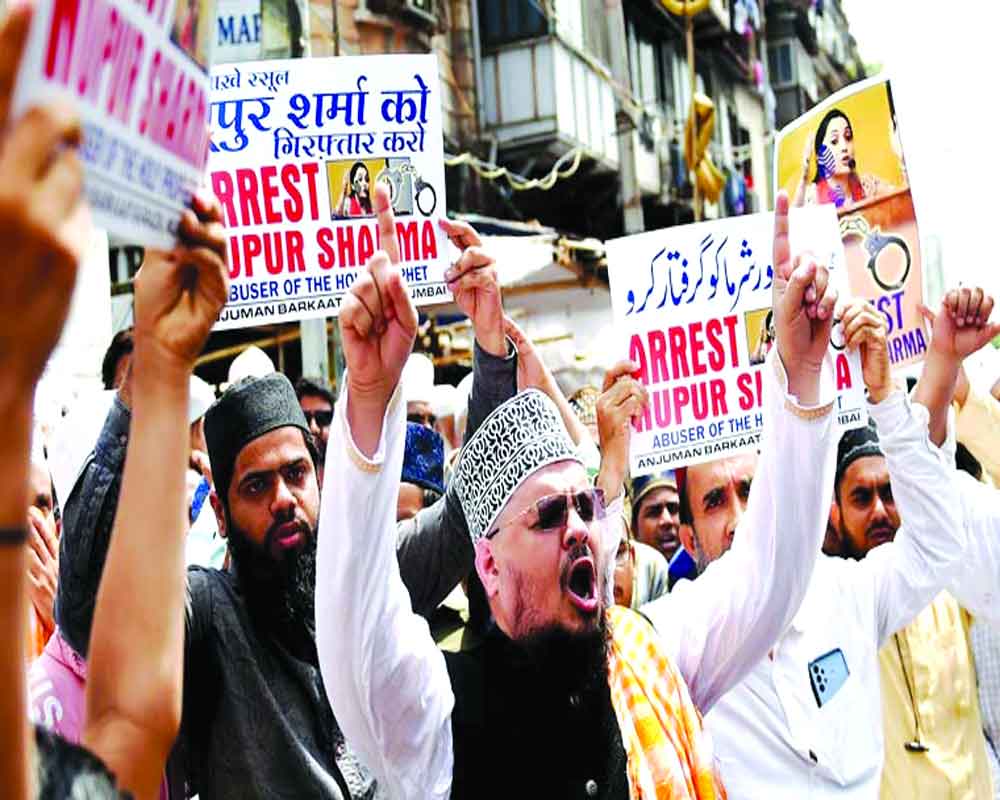There’s no merit in demands to lynch anybody without first appreciating the circumstances under which the person may have uttered angry words
In the emotional thrust and parrying of viewpoints over Nupur Sharma’s remarks, some fundamental points have been lost sight of. Now that an authentic video of the TV programme is no longer available, we can only go by inferences and deductions and try to answer some fundamental questions based on these. What exactly did Nupur say that sparked this outrage both domestically and in Islamist nations? Indications are that she alluded to some details of the Islamic Prophet’s life. Did she invent these details to malign Islam and mock its followers? If so, she deserves the strongest condemnation and a harsh punishment. If, however, what she mentioned was derived from Islamic sources, then her misdemeanour falls in the category of an unfortunate choice of words or a tactless iteration in the heat of debate. In that case, her immature simplicity was her only sin, quite understandable in somebody in her 30s. And that requires at best a reprimand from her party, the BJP, and an admonition to be more circumspect and to avoid such indiscretions.
The veracity of the above scenarios notwithstanding, was the overblown reaction to an off-the-cuff remark on national TV discussion, in response to provocation, proportionate and justifiable? Are the rabid chants of
sar-tan-se-juda asking for her beheading, in Kanpur and elsewhere, condonable in civilised society? Should it be par for the course for any community to make children hold up posters asking for somebody’s head? And all this when Nupur had already apologised unconditionally?
Something forgotten in the present overcharged discourse is what Nupur stated in a video flicker, since gone missing; that she cannot remain silent when her Mahadev is insulted and that she had made the remarks in anger. What did her Muslim interlocutor on the TV debate say about Lord Shiva that she was referring to? And why are his comments muted and lost in the din of her universal condemnation by the secular lobby in India and the Islamist one abroad?
In the pan-India protests after Friday prayers, the posters at different locations had an eerie commonality — of image, banner text. The similarity across distant locations points to coordinated planning and execution. Were the protests orchestrated by vested interests out to undermine the Modi Government by sowing discord between communities? Were these instigators, inimical to Indian national interest, inspired and funded by foreign agencies?
Now about the protests abroad. Does Qatar have any right to demand a public apology from the Government of India when in 2010 it had given shelter and honorary citizenship to artist MF Husain who, after painting Hindu goddesses in the nude, refused to appear before court and fled the country? Almost every Islamic nation, as well as the 57-member OIC, initially lambasted India for the intemperate remarks by somebody not holding any Government position. The Pakistan press lamented that “the idea of India was facing an existential crisis”, presumably because the idea was secular, quite forgetting that the country itself is a theocratic State that unabashedly persecutes minorities.
An Arab newspaper pointed out that Nupur’s Muslim co-panellist was not blaspheming Ram or Sita when in anger she uttered the offending remarks. While that may well be true, she was instead provoked probably by the worst blasphemy possible for Hindus — the ritual washing of feet, Vazoo, by Muslim worshippers at Gyanvapi mosque That surely is an offence much greater than a tactless, angry remark.
Why was the reaction overblown? The Grand Mufti of Oman exhorted all Muslims to rise as one nation, there were calls in the Gulf countries for boycott of Indian goods, and there were reminders of India’s dependence on the Gulf countries for oil imports and inward remittances.
Under Modi, India has tried its best to improve relations with the Gulf countries and obtained significant success. Modi himself has paid several visits to the region, been received warmly and had national honours bestowed on him. Pakistan often invokes the Islamic Ummah for undermining India; it did so this time also, especially with OIC. However, since its credibility is rather low, many Islamic countries did not take long to recover from the initial kneejerk reaction. The Iranian Foreign Minister after his recent visit to New Delhi approved of the Indian Government’s handling of the controversy and its fallout. The Kuwait Government has taken strict action against the anti-India protesters, even deporting some expatriates and banning them from entering the country again.
Domestically, it was a godsend opportunity for the Opposition to malign Modi and BJP. Though religious figures like the Shahi Imam of Jama Masjid in Delhi distanced themselves from the unruly protests and violent rioting, leaders who cultivate the simple, unaware Islamic vote bank played to their gallery and feigned righteous indignation. The fact that major rioting started 10 days after the TV episode lends credence to the allegation that mob anger was built up over time deliberately by leaders like Owaisi. One of the downsides of democracy is that unscrupulous politicians may pander to the rabble’s irrational sentiments for electoral gains at the cost of social cohesion; this episode illustrates it vividly.
(A former banker, the writer’s love for words and ideas has turned him towards writing columns. The views expressed are personal.)


























